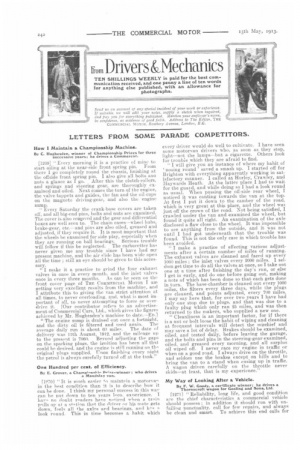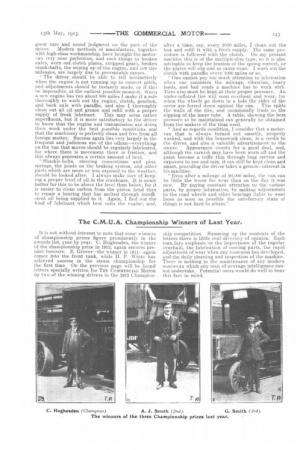Eom Drivers &Mechanics TEN SHILLINGS WEEKLY is paid for the
Page 24

Page 25

If you've noticed an error in this article please click here to report it so we can fix it.
best com. munication received, and one penny a line of ten words for anything else published, with an allowance for photographs.
Send us an account of any special incident of your work or exfierience. If suitable, we will edit your notes, suPPly a sketch when required, and pay you for everything published. Mention your employer's name, in confidence, as evidence of good faith. A d dress to The Editor, THE
COMME.RCIAL MOTOR, Rosthery Avenue, London, E.G.
LETTERS FROM SOME PARADE COMPETITORS.
How I Maintain a Championship Machine.
By C. Hughesden, winner of Championship Prizes for three successive years; he drives a Commercar.
M69] " Every morning it is a practice of mine to start oiling at the near-side front spring pin. From there I go completely round the chassis, finishing at the offside front spring pin. I also give all bolts atm nuts a glance as I go. After this the clutch-rollers, and springs and steering gear, are thoroughly examined and oiled. Next comes the turn of the engine, the valve-tappets and guides, the fan and the oil-cups on the magneto driving-gear, and also the engine sump.
" Every Saturday the crank-base covers are taken off, and all big-end pins, bolts and nuts are examined. The cover is also remsoved and the gear and differential boxes are well seen to. The chain cases—wheel hubs, brake-gear, etc.—and pins are also oiled, greased and adjusted, if they require it. It is most important that the wheels be examined for side play, especially when they are running on ball bearings. Serious trouble will follow if this be neglected. The carburetter has never given me any trouble since I have had my present machine, and the air slide has been wide open all the time ; still an eye should be given to this accessory.
" I make it a practice to grind the four exhaust valves in once in every month, and the inlet valves once in every three months. As can be seen on the front cover page of THE COMMERCIAL MOTOR I am getting very excellent results from the machine, and I attribute this to giving the van strict attention at all times, to never overloading, and, what is most important of all, to never attempting to force or overdrive it. rOur contributor refers to an advertisement of Commercial Cars. Ltd., which gives the figures achieved by Mr. Hughesden's machine to date.—En.]
"The engine sump is drained out once a fortnight, and the dirty oil is filtered and used again. The average daily run is about 60 miles. The date of delivery was 11th August, 1912. and the mileage up to the present is 7060. Beyond adjusting the gaps on the sparking plugs, the ignition has been all that could be desired, and the engine is still running on the original plugs supplied. Unon finishing every night the petrol is always carefully turned off at the tank."
One Hundred per cent. of Efficiency.
By E. Grover, a Champi•NnaH” ch.,7e-winner ; who drives a Mandalay van.
[19701 " It is much easier to maintain a motorvan in the best condition than it is to describe how it can be done. I think my personal success in this war can be put down to ten years loco. exnerience. I have no doubt readers have noticed when a train pulls up at a station that. the driver or his mate gets down, feels all the axles and bearings, and liss a look round. This in time becomes a habit which
every driver would do well to cultivate. I have seen some motorvan drivers who, as soon as they stop, light—not the lamps—but a cigarette. Others look for trouble which they are afraid to find.
" I will give you an instance of where my habit of nosing round' saved a smash up. I started off for Brighton with everything apparently working in satisfactory manner. I called at Honey, Crawley, and Haywards Heath. At the latter place I had to wait for the guard, and while doing so I had a look round as usual. When passing the off-side rear wheel, I noticed it was canting towards the van at the top. At first I put it down to the camber of the road, which is very great at this place, and the wheel was just off the crown of the road. .Not being satisfied, I crawled under the van and examined the wheel, but found it quite all right. An examination of the axle disclosed a flaw close to the wheel. It was impossible to see anything from the outside, and it was not until I had got underneath that the trouble was found. This is not the only case in which trouble has been avoided.
"I make a practice of effecting various adjustments after a certain number of miles of running. The exhaust valves are cleaned and faced up every 1000 miles ; the inlet valves every 2000 miles. I seldom get time to do all the valves at once, so I take out one at a time after finishing the day's run, or else J get in early, and do one before going out, making a note of which has been done so that. each gets done in turn. The base-chamber is cleaned out every 1000 miles, the filters every three days, while the plugs are cleaned, and points adjusted, every 700 miles. I may say here that, for over two years I have had only one stop due to plugs, and that was due to a faulty plug which only ran 25 miles, and was then returned to the makers, who supplied a new one.
" Cleanliness is an important factor, for if there is a nut or bolt loose the habit of wiping and cleaning at frequent intervals will detect the mischief and may save a lot of delay. Brakes should be examined, oiled, and tested daily, before leaving the garage, and the bolts and pins in the steering-gear examined, oiled, and greased every morning, and all surplus oil wiped off. I never race my engine in traffic or when on a good road. I always drive on the throttle, and seldom use the brakes except on hills and to bring the van to a stand when easing up in traffic. A wagon driven carefully on the throttle never skids—at least, that is my experience."
My Way of Looking After a Vehicle.
By F. W. Goody, a certificate winner; he drives a Thornycroft wagon for Gosling and Sons, Ltd.
r12711 "Reliability, long life, and good condition are the chief characteristics a commercial vehicle should possess : in addition it should run with unfailing punctuality. call for few repairs, and always be clean and smart. To achieve this end calls for great care and sound judgment on the part of the driver. Modern methods of manufacture, together with high-class workmanship, have brought the motorvan very near perfection, and such things as broken axles, worn out clutch plates, stripped gears, broken crankshafts, the seizing up of the engine, and low tire mileages, are largely due to preventable causes.
" The driver should be able to tell instinctively when the engine is not running up to concert pitch, and adjustments should be instantly made, or if this be impossible, at the earliest possibte moment. t hen a new engine has run about 800 miles I make it a rule thoroughly to wash out the engine, clutch, gearbox, and back axle with paraffin, and also I thoroughly clean out all oil and grease and refill with a proper supply of fresh lubricant. This may seem rather superfluous, but it is more satisfactory to the driver to know that the engine and transmission are doing their work under the best possible conditions and that the machinery is perfectly clean and free from all foreign matter. Success again lies very largely in the frequent and judicious use of the oilcan—everything on the van that moves should be regularly lubricated, for where there is movement there is friction, and this always generates a certain amount of heat.
" Shackle-bolts, steering connections and pins, springs, the joints on the braking system, and other parts which are more or less exposed to the weather, should be looked after. I always make sure of keeping a proper level of oil in the crankcase. It is much better for this to be above the level than below, for it is easier to clean carbon from the piston head than to repair a bearing that has melted through insufficient oil being supplied to it. Again, I find out the kind of lubricant which best suits the engine, and,
after a time, say, every 2000 miles, I clean out the box and refill it with a fresh supply. The same procedure is followed with the clutch. On my present machine this is of the multiple-disc type, so it is also advisable to keep the tension of the spring correct, or the plates will slip and so cause wear. I wash out the clutch with paraffin every 1000 miles or so.
"One cannot pay too much attention to lubrication when one considers the mileage, vibration, heavy loads, and bad roads a machine has to work with. Tires also must be kept at their proper pressure. An under-inflated tire will soon overheat and wear, for when the wheels go down in a hole the sides of the cover are forced down against the rim. This splits the walls of the tire, and occasionally leads to the nipping of the inner tube. A table, showing the beat pressure to be maintained can generally be obtained from the makers of the tires used.
" And as regards condition, 1 consider that a motorvan that is always turned out smartly, properly washed, and with the brasswork clean, is a credit to the driver, and also a valuable advertisement to the owner. Appearance counts for a good deal, and, although the varnish may have been worn off and the paint become a trifle thin through long service and exposure to sun and rain, it can still be kept clean and smart, providing the driver takes a genuine interest in his machine.
"Even after a mileage of 20,000 miles, the van can be little the worse for wear than on the day it was new. By paying constant attention to the various parts, by proper lubrication, by making adjustments to the road wheels and other bearings liable to wear loose as soon as possible the satisfactory state of things is not hard to attain."


























